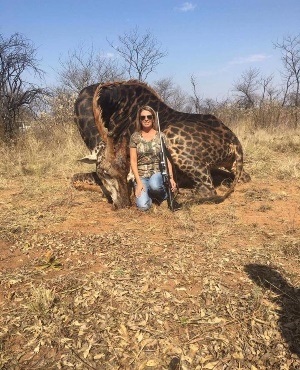
After pictures of a 37-year-old American woman posing next to the carcass of a giraffe bull surfaced online, social media exploded in disgust.
Kentucky-born Tess Thompson Talley posted the photos on Facebook with the caption: "Prayers for my once in a lifetime dream hunt came true today! Spotted this rare black giraffe bull and stalked him for quite a while."
READ: 'It's called conservation': US woman under fire for killing 'rare' giraffe in SA hits back
The images were reposted on Twitter Africa Digest’s, with more than 44 000 people retweeting the scathing post.
"White American savage who is partly a Neanderthal comes to Africa and shoot down very rare black giraffe courtesy of South Africa stupidity," they tweeted.
Celebrities weighed in too, with Will & Grace actress Debra Messing posting: "Tess Thompson Talley from Nippa, Kentucky, is a disgusting, vile, amoral, heartless, selfish murderer."
British comedian Ricky Gervais, who created The Office, was scathing in his response, tweeting: "What’s sixteen feet tall and has a c*** on the back of its neck?"
He later wrote on Twitter that "giraffes are now on the 'red list' of endangerment due to a 40% decline over the last 25 years. They could become extinct. Gone forever".
Despite these vicious condemnations on social media, research shows that trophy hunting contributes significantly to South Africa’s economy, earning nearly R2bn annually.
This is according to a study by Professor Peet van der Merwe from Trees (Tourism Research in Economic Environs and Society) in conjunction with the Professional Hunters’ Association of South Africa (Phasa).
Most hunters insist on hunting wild game instead of animals bred in captivity for hunting purposes (such as "canned lion-hunting"), the study shows.
Hunting giraffes in South Africa
Hunting giraffes in South Africa is legal as long as the proper permission has been obtained from the game farm in question.
Talley tried to defend herself, insisting that the giraffe had been old and was a danger to the younger bulls because he’d been attacking them. She alleges it was necessary to shoot the animal.
"It’s a misconception [that giraffe populations are dwindling in South Africa]," says Koos Barnard, editor of the magazine SA Hunter/Jagter. "Like most other types of game, their numbers need to be culled."
"Giraffes on many game reserves don’t have any natural enemies. Lions are really the only predators capable of killing a giraffe. To control the populations, the animals have to be sold or slaughtered," Barnard explains.
'Much crueller to let a giraffe die of old age'
But the market is saturated and it’s nearly impossible to sell these animals, especially when they’re old, he adds. The average life expectancy is 10 to 15 years and as they get older their digestive systems start failing and they starve.
"It’s much crueller to let a giraffe die of old age," says Flip Coetzee, a dentist from Mossel Bay, who is also a member of the South African Hunters and Game Conservation Association.
"A death like that [of old age and organ failure] is much more painful than shooting a giraffe with the right calibre rifle and in the right way. We train hunters in this."
He feels the giraffe saga has been blown out of proportion. "We work closely with conservation bodies to ensure the money is also channelled to them," he adds.
A game farmer needs to make a living, Barnard says. "They need a trophy hunter to kill the animals before they can be slaughtered. The animal’s meat is tough when it’s an old animal and the meat is sold to butcheries where it’s processed into for example polony."
An adults giraffe equals between 900kg and 1 500kg of meat. So the trophy hunter pays thousands of dollars to hunt the animal and in turn get to process the skin and taxidermy the head as a trophy to take back to their country.
"Many people don’t realise that every part of the animal is used, even if it was killed by a trophy hunter," Barnard adds. He says people tend to get emotional when iconic animals such as giraffes, lions and elephants are shot, but farms and reserves have limited space for the animals.
What he’s not comfortable with is hunters posting pics of themselves with their kills on social media.
Just 3% of the income from trophy hunting reaches the communities who are affected by it, the International Council for Game and Wildlife Conservation found in a study. But Minister of Environmental Affairs Edna Molewa maintains the hunting industry adds earns millions for the local economy.
Travel expenses aside, a trophy hunter will spend on average R127 000 on a hunting trip to South Africa.
The most popular animals to hunt are antelope, warthog, springbok, kudu and blesbuck, while buffalo, lions, sable antelope, kudu and njala bring in the most money.
"Hunting is a form of sustainable ecotourism," Van der Merwe says. "Just look at how much money hunters spend compared to other tourists."
He reckons the hunting industry can contribute to work creation in rural areas, adding that it’s a profitable niche market that shouldn’t be neglected.
"We should be doing more to protect the hunting industry’s image."
SOURCES: theguardian.com, en.wikipedia.org, proagri.co.za




 Publications
Publications
 Partners
Partners
















